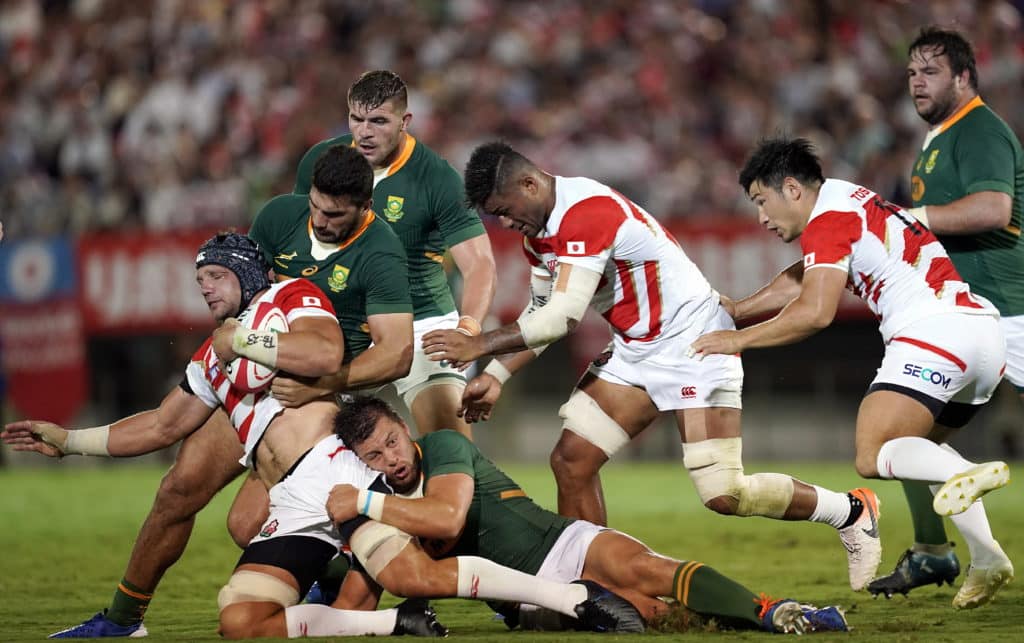Japan will pose a unique threat to the more-fancied Springboks in the quarter-final on Sunday.
Japan’s success at this World Cup is no fluke. Coach Jamie Joseph and captain Michael Leitch went out of their way to make this point after the monumental victory against Scotland in Yokohama on Sunday night.
Japan have made their own luck. They’ve kicked on since the Brighton miracle of 2015 to claim more tier-one scalps. They’ve gone on to qualify for the World Cup playoffs for the first time in history and, as Leitch said on Sunday, they are not done yet.
ALSO READ: Passion and skill power Japan engine
Like many others, I was surprised by their success against Ireland in the second game of their campaign. After witnessing their approach against Russia, Ireland and Samoa, however – not to mention the manner in which their threat was amplified by the fantastic local support – I expected the result against Scotland.
‘That kind of support can lift a team by 10 to 20%,’ Scotland coach Gregor Townsend said afterward. Indeed, anybody who was at the ground for the occasion – which was nearly cancelled due to typhoon Hagibis – will vouch for the fact that the fans played their part. The clamour inside the Yokohama cauldron was relentless and appeared to supply Japan with extra energy on attack and defence.
‘They played South Africa a few weeks back and that scoreline [41-7] wasn’t a true reflection of the contest,’ Townsend added. ‘South Africa are in for a tough challenge when they face Japan in the quarter-final. I think that game will be very close.’
Bok coach Rassie Erasmus has been consistent about this since the lead-up to the World Cup. Following that win against Japan in Saitama, Erasmus praised the innovation of the coaching staff as well as the fitness levels of the players. Erasmus has gone on to highlight Japan’s strengths in the wake of each victory during the pool phase.
The current Bok side is not as experienced as the side that travelled to the World Cup in England four years ago. They’re also not as complacent and if Erasmus and some of the senior players are to be believed they will treat Japan with the same respect as they would the All Blacks in the lead-up to the quarter-final.
There’s no easy road to the final. If the Boks clear the Japanese hurdle, they are likely to run into Wales, who they haven’t beaten since 2015. Their most recent performance against the All Blacks does not bode well for a possible rematch with their old rivals in the decider.
A couple of upsets on the other side of the draw won’t make their task any easier. In 2007, the Boks celebrated in their hotel rooms after they heard that the All Blacks had been knocked out of the tournament by France. This year, they will know that England or Ireland have the ability to prevail in a final.
ALSO READ: ‘Today was about emotion, physicality’
The Springboks must not look beyond this week, though. Erasmus and Co have made all the right noises thus far and it would appear that they are not underestimating the hosts’ tactics or the influence of the crowd.
There is a possibility that the pressure will get to Japan ahead of their first playoff appearance. Joseph spoke about this after the win against Scotland.
The Japanese people have treated the players and coaches like royalty over the past few weeks. Joseph said that the coaches and senior players have to manage that ‘noise’ carefully over the next few days. It can be disruptive during the week, yet a powerful source of energy on game day.
The Springboks should prepare for a scenario in which Japan strike that balance. No team has beaten the Brave Blossoms at this tournament and it’s going to take something special from the Springboks to end that streak.





